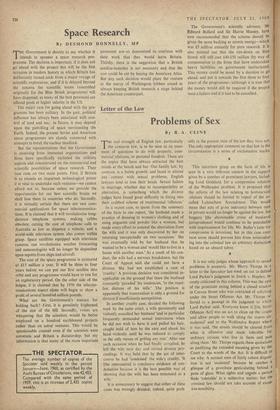Letter of the Law
Problems of Sex By R. A. CLINE THE real strength of English law, particularly the common law, is to be seen in its treat- ment of questions to do with property, com- mercial relations, or personal freedotn. These are the topics that have always attracted the best minds at the bench and bar. Our family law, by contrast, is a feeble growth, and faced in almost any context with sexual problems, English lawyers tend to lose their heads. Sexual failure in marriage, whether due to incompatibility or aberration, is something which the divorce judges have found great difficulty in fitting into their crabbed scheme of matrimonial 'offences.'
In a recent case, to quote from the summary of the facts in one report, 'the husband made a practice of dressing in women's clothing and of using unguents and powder like a woman, but made every effort to conceal the aberration from the wife and it was only discovered by her on returning unexpectedly on two occasions.' She was eventually told by her husband that he wanted to be a woman and 'would like to live in a house with another man.' As a result of his con- duct, the wife had a nervous breakdown, but the Court of Appeal said she could not have a divorce. She had not established a case of `cruelty.' A previous decision was considered in- applicable on the ground that there the husband constantly 'paraded' his tendencies, `to the mani- fest distress of his wife.' The position is apparently that transvestism is only a ground for divorce if insufficiently surreptitious.
In another cruelty case, decided the following week by the same court, a wife persistently and violently assaulted her husband 'and in particular frequently demanded sexual intercourse when he did not wish to have it and pulled his hair, caught hold of him by the ears and shook his head violently until he was induced to comply as the only means of getting any rest.' After one such occasion when he had finally complied, he left the wife next day and started divorce pro- ceedings. It was held that by the act of inter- course he had 'condoned' the wife's cruelty. 'It [the intercourse] is conclusive evidence of con- donation because it is the best possible way of, showing that the wife has been reinstated as a wife.'
It is unnecessary to suggest that either of these cases was wrongly decided; indeed, quite prob ably in the present state of the law they were nc t. The only appropriate comment on that law in 0 ie circumstances is a series of exclamation mark s.
This uncertain grasp on the facts of life is seen in a very different context in the support given by a number of prominent lawyers, includ- ing ing Lord Goddard, for a compromise solution of the Wolfenden problem. It is proposed that the reform of the law relating to homosexual offences should be limited to repeal of the s, called Labouchere Amendment. This would mean that acts of gross indecency between in( n in private would no longer be against the law, but buggery (the abominable crime of mediaeval jurisprudence) would continue to be punishable with imprisonment for life. Mr. Butler's taste for r compromise is notorious, but in this case com- mon sense should prevent him from reintroduc- ing into the criminal law an arbitrary distinction based on an absurd taboo.
*
It is not only judges whose approach to sex u problems is eccentric. Mr. Harry Thorpe in letter to the Spectator last week set out to defe Lord Parker's judgment in Smith v. Hughes, cently criticised in this column. This was the ca of the prostitute sitting behind a closed windc in Curzon Street who was convicted of solicitil under the Street Offences Act. Mr. Thorpe ferred to a passage in the judgment in* whi Lord Parker said, 'Everyone knew it [the Strc Offences Act] was an act to clean up the strci and allow people to walk along the streets u molested' and to the Wolfenden Report where it was said, 'the streets should be cleared from what is offensive and made tolerable f ordinary citizens who live in them and l along them.' Mr. Thorpe regards these quotatio as justifying the extended meaning given by t Court to the words of the Act. It is difficult see why. A normal man of fairly robust dispo tion is not 'molested' because he catches glimpse of a prostitute gesticulating behind pane of glass. What sights and sounds a pers finds 'tolerable' is a subjective matter, but t criminal law should not take account of exc sive sensibility. al a i se ig e- l et ts or ass ns
he
to si- a a
on he






















































 Previous page
Previous page